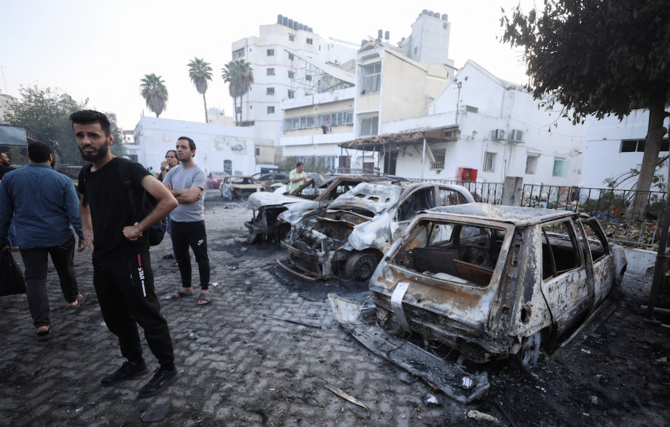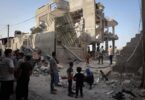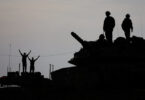Yossi Mekelberg
The collapse of the truce in Gaza was as regrettable as it was expected, and one of the immediate costs was that it prevented the release of one last group of women and children being held hostage by Hamas, in exchange for the release of Palestinian prisoners.
So the fighting resumed and the already unbearable death toll among the people of Gaza swiftly began to rise. The focus of the Israel Defense Forces has shifted toward the south of the Strip in pursuit of Hamas leaders Yahya Sinwar and Mohammed Deif, among other senior officials, who are believed most likely to be holed up in the tunnels under the city of Khan Younis or the refugee camp nearby, and this is exacerbating an already intolerable humanitarian crisis.
Few observers expected the week-long pause in the fighting to become a longer-term humanitarian ceasefire, let alone a permanent one. At this point, Israel remains determined to end the war in a position from which it can declare victory; Hamas is unlikely to lay down its arms and surrender of its own accord; and the international community is still unwilling to enforce a ceasefire.
What is not being taken into account with the required sense of urgency is that it is the civilians of Gaza who are literally caught in the crossfire and paying an extremely heavy price, and for this there can be no excuse. In the coming days, perhaps weeks, if the war is allowed to rage on, the death toll and the suffering among ordinary Palestinians is bound to increase as the military campaign is concentrating on areas that are highly populated, not only by long-term residents but by people displaced from northern Gaza who were actively encouraged by Israeli authorities to move south while the military operations focused on the north, and who now have nowhere left to run to escape the hellish situation.
Both Israel and the US blame Hamas for the collapse of the truce, accusing the group of reneging on commitments it made by failing to provide a list of the last group of kidnapped women and children it intended to release, and launching rockets at Israeli territory on the very morning that the release was supposed to take place.
Moreover, Hamas negotiators were accused of shifting the goalposts when it came to listing the category of hostages to be released next. The situation was made worse when the militant group claimed responsibility for killing three Israelis, and injuring several more, after two Palestinian gunmen opened fire at a bus stop in West Jerusalem.
But it was always just a matter of time anyway before Israel resumed the war, as it stated it would. It is unclear what the leaders of Hamas were thinking, as they were probably the side that most, even desperately, needed the truce to be extended. Israel’s resumption of hostilities also means risking the lives of more than half of the hostages taken by Hamas on Oct. 7 who remain in captivity.
However, the mood in Israel demands that those responsible for the horrific attack on Israel be punished and so the war will continue until Hamas is defeated, despite warnings from humanitarian organizations operating in Gaza that the situation there is disastrous for Palestinian civilians. Very little can be done in practice to help those caught up in the appalling carnage.
The UN Relief and Works Agency for Palestine Refugees in the Near East — the UN agency tasked with providing development and humanitarian services for Palestinians across the region — despite for years being deprived of adequate resources and the international political support required to fulfill its mission, is now on the verge of total collapse in the Gaza Strip.
At least 130 of its workers have been killed since the current conflict began and the humanitarian window within which they can operate is closing fast. The head of the organization, Commissioner General Phillippe Lazzarini, warned: “The resumption of the military operation and its expansion further in southern Gaza is repeating horrors from past weeks (and) the number of civilians killed is rapidly increasing. Civilians, including men, women, children, older persons, the sick and people with disabilities are the most to suffer.”
Two months into the war, Israel has not yet defined what would constitute accomplishment of its goal of destroying Hamas, or at what point it might change its tactics to continue its war without inflicting the tremendous amount of suffering on civilians. Not only does this situation create unbearable uncertainty for the people of Gaza, it also leaves a timescale for the end of the war open-ended, adding to the fear and stress under which people are living. Many of them say they view every day as their last.
Since the end of the pause in fighting, Israel’s bombardment has intensified and people are constantly being ordered to evacuate, most recently from Khan Younis to Rafah. This order created panic, fear and anxiety, and forced 60,000 people to move to already overcrowded UNRWA shelters.
Nearly 1.9 million people — more than 85 percent of the population — have been displaced across the Gaza Strip and 1.2 million of them are sheltering in UNRWA facilities, mostly in the south where much of the fighting is currently taking place. These shelters are inadequate for such huge numbers of people to live and survive in, and they are concentrated in an area that is less than one-third of the total area of the tiny territory. They have little or no access to food, water or shelter, and live in constant fear for their lives.
In the face of such enormous suffering, the silence of the international community is deafening. Israel’s right to wage war on Hamas was dictated by the actions of the militant group on Oct. 7. Not surprisingly, the international community was shocked by the attack and rightly expressed its support for Israel. At some point, however, and sooner rather than later, that same international community, the US first and foremost, must bring the war to an end.
It must realize that fighting Hamas is primarily a battle on behalf of the politically marginalized that will only be won by ensuring a better future that is free from both repression by Hamas and Israel’s oppressive occupation. It is obviously in the interest of Palestinians for the war to come to an end. But it is also in Israel’s best interest because the longer it continues, the deeper the hole the country is digging for itself without any exit strategy, while also losing the moral battle and, with it, international support.







